|
|
|
Sort Order |
|
|
|
Items / Page
|
|
|
|
|
|
|
| Srl | Item |
| 1 |
ID:
164609
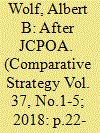

|
|
|
|
|
| Summary/Abstract |
If grand strategy is a state's theory of how to produce security for itself, what should the U.S. grand strategy be toward Iran? This is an important question that has only grown since the Trump administration announced it would not recertify Iran under the Joint Comprehensive Plan of Action (JCPOA). This article lays out four options: rollback, offshore balancing, retrenchment, and engagement. Each strategy has its merits as well as its drawbacks.
|
|
|
|
|
|
|
|
|
|
|
|
|
|
|
|
| 2 |
ID:
163154
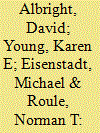

|
|
|
| 3 |
ID:
152032
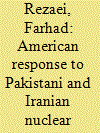

|
|
|
|
|
| Summary/Abstract |
This article explores the paradox in the reaction of the United States to the two different proliferation cases: Pakistan's proliferation and Iran's weaponization effort. The article tries to find answer to the following key question; why the United States, as one of the guardians of the Non-proliferation Treaty (NPT) which would prefer to see a region that is entirely free of weapons of mass destruction, ultimately has accepted Pakistan's proliferation, while imposed considerable amount of pressure to stop Iran from acquiring nuclear weapons.
|
|
|
|
|
|
|
|
|
|
|
|
|
|
|
|
| 4 |
ID:
184394
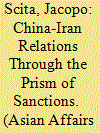

|
|
|
|
|
| Summary/Abstract |
The article aims to understand how China has dealt with the puzzle of Iran's sanctions. Beijing's approach and reaction to the question of sanctioning Tehran and abiding by the sanctions imposed by the United States and the UNSC are a response to a complex matrix formed by three distinct but co-existing dimensions: the bilateral relationship with Iran, that with Washington, and its own positioning within the international community. Each dimension is associated with the performance of a specific international role. What emerges from the analysis of three case studies – the introduction of the 1996 Iran and Libya Sanction Act, the UNSC resolutions imposing sanctions on Iran (2006-10), and the response to Washington's Maximum Pressure campaign – is that, for China, Iran's sanctions are an inherent source of conflicts between its roles. Ultimately, Beijing's responses to the emerging conflicts between its roles have been cautious and aimed at tempering their possible escalations, even though the case studies show that a quite visible hierarchy of roles exists. China's role vis-à-vis Iran occupies a lower position than those performed vis-à-vis the United States and the international community.
|
|
|
|
|
|
|
|
|
|
|
|
|
|
|
|
| 5 |
ID:
169973
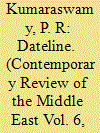

|
|
|
|
|
| Summary/Abstract |
The decision of the Trump administration to withdraw from the Joint Comprehensive Plan of Action (JCPOA)—the carefully crafted July 2015 nuclear deal with Iran—has plunged the Middle East into a deep crisis. President Donald Trump’s May 2018 decision was followed by him imposing a series of unilateral sanctions against Iran. The limited waiver granted to a few countries including India and China were not extended in May 2019, thereby highlighting Washington’s decision to completely stop Tehran from exporting oil, the primary force behind the Iranian economy.
|
|
|
|
|
|
|
|
|
|
|
|
|
|
|
|
| 6 |
ID:
169153
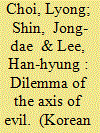

|
|
|
|
|
| Summary/Abstract |
This research examines the international relations between North Korea (the
Democratic People’s Republic of Korea or DPRK) and Iran in the context of their
shared perception of a threat from the United States. We discuss the conventional
idea of the international relationship—the enemy of my enemy is my ally—to
explain Pyongyang–Tehran relations, evaluate its past and current relations, and
offer policy suggestions for the recent denuclearization approach toward North
Korea and Iran. Using newly discovered archival resources and political records, we
challenge the conventional idea that the two states share the same threat perception
in a consistent manner and suggest the level of their military cooperation changes
depending on the approach from Washington and the international community. This
research provides a more exact picture of the international relations North Korea
and Iran since the 1980s and of the link between their shared threat perception and
denuclearization debates.
|
|
|
|
|
|
|
|
|
|
|
|
|
|
|
|
| 7 |
ID:
174893
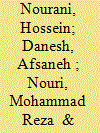

|
|
|
|
|
| Summary/Abstract |
On May 8, 2018, President Trump withdrew the US from the Joint Comprehensive Plan of Action (JCPOA). Since the JCPOA is endorsed by a United Nations Security Council Resolution and supported by the international community, Trump has had to justify this controversial decision. Based on data extracted from Trump’s Twitter account and taking advantage of Theo van Leeuwen’s (2008) discursive construction of the legitimation model, this article addresses the following question: How has Donald Trump attempted to delegitimize the JCPOA? Findings in this article show that Trump used the strategies of moral evaluation and rationalization in an attempt to delegitimize the JCPOA.
|
|
|
|
|
|
|
|
|
|
|
|
|
|
|
|
| 8 |
ID:
177832
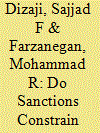

|
|
|
|
|
| Summary/Abstract |
Do sanctions reduce military spending in Iran? To answer this question, we use annual data from 1960 to 2017 and the autoregressive distributed lag (ARDL) model. We show that an increase in the intensity of sanctions is associated with a larger decrease in military spending in both the short and the long run. Each level of increase in the intensity of sanctions with respect to our coding approach decreases military spending in the long run by approximately 33%, ceteris paribus. We also find that only the multilateral sanctions, in which the United States acts in conjunction with other countries to sanction Iran, have a statistically significant and negative impact on military spending of Iran in both the short and the long run. Multilateral sanctions reduce Iran’s military spending by approximately 77% in the long run, ceteris paribus. The results remain robust when controlling for other determinants of military spending such as gross domestic product (GDP), oil rents, trade openness, population, quality of political institutions, military expenditure of the Middle East region, non-military spending of government and the war period with Iraq.
|
|
|
|
|
|
|
|
|
|
|
|
|
|
|
|
| 9 |
ID:
141546
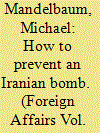

|
|
|
|
|
| Summary/Abstract |
The Joint Comprehensive Plan of Action (JCPOA), reached by Iran, six other countries, and the European Union in Vienna in July, has sparked a heated political debate in the United States. Under the terms of the agreement, Iran has agreed to accept some temporary limits on its nuclear program in return for the lifting of the economic sanctions the international community imposed in response to that program. The Obama administration, a chief negotiator of the accord, argues that the deal will freeze and in some ways set back Iran’s march toward nuclear weapons while opening up the possibility of improving relations between the United States and the Islamic Republic, which have been bitterly hostile ever since the 1979 Iranian Revolution. The administration further contends that the agreement includes robust provisions for the international inspection of Iran’s nuclear facilities that will discourage and, if necessary, detect any Iranian cheating, triggering stiff penalties in response.
|
|
|
|
|
|
|
|
|
|
|
|
|
|
|
|
| 10 |
ID:
144562
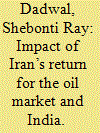

|
|
|
|
|
| Summary/Abstract |
As was anticipated, the nuclear sanctions imposed against Iran were finally lifted on January 16, 2016 after it was certified by the International Atomic Energy Agency (IAEA) that Iran had met its obligations under the Joint Comprehensive Plan of Action (JCPOA) reached in July 2015 among six world powers. The deal has not only allowed Iran access to the billions of dollars of assets in international bank accounts that were frozen during the sanctions period, but will also possibly see thousands of barrels of Iranian crude added to its current exports of 2.9 million barrels per day (mb/d), with the possibility of 1 million barrels extra per day (mb/d) by the end of 2016.
The announcement of the end to the sanctions regime imposed on Iran, has reiterated what the markets have been predicting for a while—that any recovery in oil prices will not be taking place till the end of the year at least, if not longer. But more importantly, what will it mean for the oil market in general and for the Persian Gulf oil-exporting states in particular at a time when the oil market is witnessing a 12-year low with prices that have dipped under $30 a barrel? Interestingly, despite the slump, demand has been tepid at best, contributing to the dismal price scenario. Given that the market was over-supplied by around one mb/d already, why did Washington allow Iran to return to the oil market at a time when the US oil sector was adversely affected by the low oil prices?
|
|
|
|
|
|
|
|
|
|
|
|
|
|
|
|
| 11 |
ID:
166031
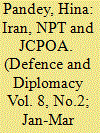

|
|
|
| 12 |
ID:
152977
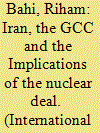

|
|
|
|
|
| Summary/Abstract |
The Joint Comprehensive Plan of Action, also known as the Iran nuclear deal, is consequential for Middle East regional security. It has raised a number of concerns for Arab Gulf states in relation to an emboldened Iran after sanction relief and the perceived shift of the US away from supporting its traditional allies in the Gulf. The international recognition and incorporation of Iran into regional power constellations resulting from the deal will intensify Saudi-Iranian rivalry to assert dominance. This rivalry and competition will increase in the short run, however, regional crises are expected to highlight the need for dialogue and engagement on regional affairs.
|
|
|
|
|
|
|
|
|
|
|
|
|
|
|
|
| 13 |
ID:
189843
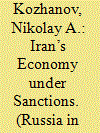

|
|
|
|
|
| Summary/Abstract |
Iran’s economy has lived under sanctions for the last forty years. Yet their
pressure has been uneven: the most sensitive measures were applied against
Iran by the U.S. and its partners in 2010–2015 and in 2018–2022. However,
despite gloomy expectations of grave consequences for Iran’s economy,
it has managed to survive: it has been damaged but not shattered. The
Iranian government has succeeded in securing control over the domestic
political situation. Even though Tehran has been unsuccessful in completely
offsetting the negative impact of the sanctions, it has mitigated their effect
in the short term and won time necessary for devising a long-term program
of anti-sanctions measures. This article analyzes the impact of sanctions on
Iran’s economy with a special focus placed on the factors that determined
their partial success/failure. The paper also analyzes the lessons Iran could
draw from its experience in resisting U.S. sanctions that may be helpful
in counterbalancing the short- and long-term impact of the current U.S.
pressure on the country’s economy.
|
|
|
|
|
|
|
|
|
|
|
|
|
|
|
|
| 14 |
ID:
171542
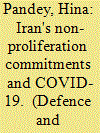

|
|
|
| 15 |
ID:
174880
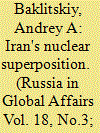

|
|
|
|
|
| Summary/Abstract |
The biggest positive factor is that the JCPOA is still alive and can be revived any time. Tehran has stated more than once that it will reciprocate as soon as the United States resumes its obligations. It is simpler to stop an undeclared war, pretending that it was never waged. On the negative side, the superposition could “implode,” resulting in one of two possible variants. Both the U.S. and the Israeli authorities would prefer the JCPOA to be “dead.
|
|
|
|
|
|
|
|
|
|
|
|
|
|
|
|
| 16 |
ID:
168092
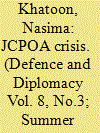

|
|
|
| 17 |
ID:
159016


|
|
|
|
|
| Summary/Abstract |
The 2015 Joint Comprehensive Plan of Action (JCPOA) provided a poignant example of how Iran successfully pursued a unique grand strategy that was established following, and had evolved since, the 1979 Revolution. As a result, Tehran was able to stifle attempts by Washington, DC to influence domestic Iranian affairs. In this context, this article argues that Iran's grand strategy juggled a commitment to the regime's revolutionary mantra, formed in 1979, and a pragmatic approach to pursuing national interests. This is accomplished by analyzing the foundation and evolution of Iran's grand strategy, and where the US fits in this dynamic. By focusing on the negotiations leading up to and the eventual signing of the JCPOA, this article sheds light on how Iran's grand strategy was formulated, what constitutes the main drivers and barriers to the strategy, and indeed how this manifested itself in the US–Iran relationship context.
|
|
|
|
|
|
|
|
|
|
|
|
|
|
|
|
| 18 |
ID:
157821
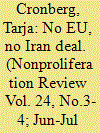

|
|
|
|
|
| Summary/Abstract |
The Iran deal is a European success story of “effective multilateralism.” An initiative by three European states, initiated in response to the US-led military action in Iraq, ultimately demonstrated that proliferation risks can be addressed by diplomacy. Over a decade's time, the European Union (EU) framed the negotiations over Iran's nuclear program in a way that enabled two hostile parties—the United States and Iran—to meet in talks leading to a successful understanding. Two years after its implementation, the deal seems to be working. However, despite Iranian compliance, the deal now faces an uncertain future. The Donald J. Trump administration's Iran policy remains unclear, though there are indications to expect diverging views between the United States and the European Union, further challenging a transatlantic link that had already faced challenges during the negotiations. This article re-examines the history of the negotiations through the lens of the strategic choice the EU faces in its foreign and security policy: steering between effective multilateralism and transatlantic relations.
|
|
|
|
|
|
|
|
|
|
|
|
|
|
|
|
| 19 |
ID:
168010
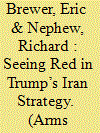

|
|
|
|
|
| Summary/Abstract |
Since Iran’s May 2019 announcement that it would no longer abide by some nuclear restrictions under the Joint Comprehensive Plan of Action (JCPOA), the Trump administration has sought to push back against these moves by citing the imperative of the JCPOA’s constraints. The JCPOA created limits on Iran’s nuclear fuel cycle that mean Tehran would need a year to produce enough nuclear material for a bomb, and the agreement established enhanced transparency and inspector access throughout the entire fuel cycle.
|
|
|
|
|
|
|
|
|
|
|
|
|
|
|
|
| 20 |
ID:
174921
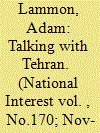

|
|
|
|
|
|
|
|